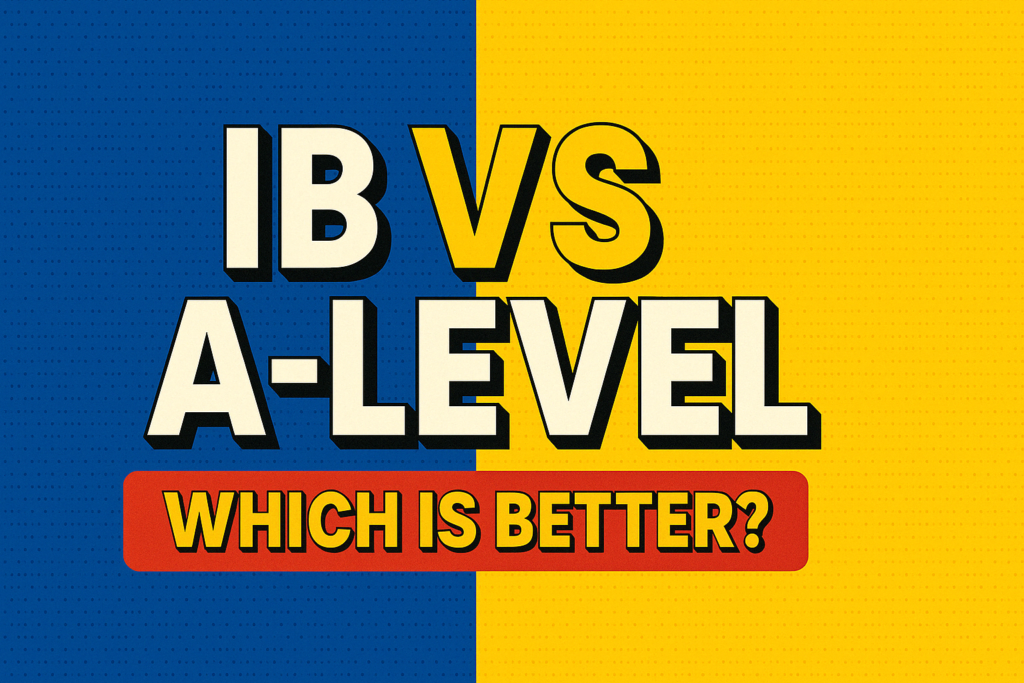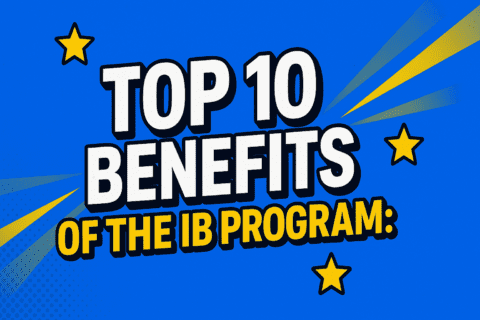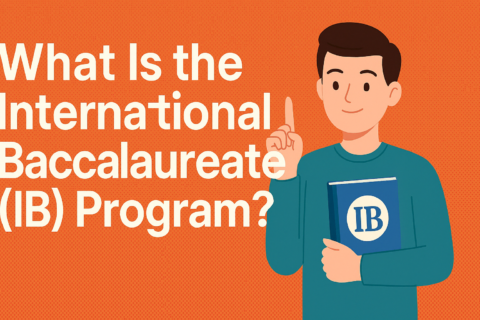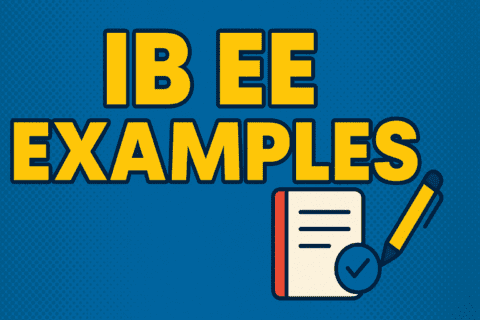IB vs A-Level: Which Is Better for You?
Choosing between the International Baccalaureate (IB) and A-Levels is one of the most important academic decisions for high school students aiming for global university admissions. If you’re wondering “IB vs A-Level which is better,” this guide will help you compare the two side by side so you can make an informed choice.
Whether you’re a student, parent, or academic advisor, this blog breaks down the strengths, challenges, and career prospects of both programs.
🎯 IB vs A-Level: Quick Comparison Table
| Feature | IB Diploma Programme (IBDP) | A-Levels |
|---|---|---|
| Subjects Studied | 6 subjects + Core (EE, TOK, CAS) | Typically 3–4 subjects |
| Curriculum Type | Broad and holistic | In-depth and specialized |
| Duration | 2 years | 2 years |
| Assessment | Exams + coursework + internal assessments | Mostly exam-based |
| Grading Scale | 1–7 per subject (45 max with bonus) | A*–E per subject |
| University Recognition | Globally recognized | Globally recognized, strong in UK |
📘 What Is the IB Diploma Programme?
The IB Diploma Programme is an internationally standardized two-year curriculum:
Students choose 6 subjects: 3 at Higher Level (HL) and 3 at Standard Level (SL)
Includes the Extended Essay (EE), Theory of Knowledge (TOK), and Creativity, Activity, Service (CAS)
Encourages research, interdisciplinary thinking, and global citizenship
Key Strengths of IB:
Encourages well-rounded education
Develops strong research and writing skills
Ideal for students unsure of their specialization
Highly respected by Ivy League and Oxbridge universities
Challenges:
Demanding time management
Requires consistent performance across all subjects
📚 What Are A-Levels?
A-Levels (Advanced Level qualifications) are subject-based qualifications offered by UK curriculum schools:
Students usually pick 3 to 4 subjects to study in depth
No compulsory core components like the IB
Assessment is typically exam-heavy, with some coursework in certain subjects
Key Strengths of A-Levels:
Ideal for students with clear academic interests
Allows specialization and deep expertise
Flexible scheduling and less academic pressure outside subject focus
Challenges:
Less breadth compared to IB
May limit options if students change interests
🎓 University Admissions: IB vs A-Level
| Country | IB Recognition | A-Level Recognition |
|---|---|---|
| UK | Highly valued, especially at Oxbridge | Traditional and well-understood |
| US | Equated to APs; college credit often awarded | Accepted but may need SAT/ACT scores |
| EU | Fully accepted | Fully accepted |
| Canada | IB can earn university credit | A-Levels accepted |
| UAE | Both widely recognized | Both widely recognized |
Pro Tip: For top-tier US and UK universities, the IB often gives applicants a competitive edge due to its rigor and global perspective.
🧠 Learning Styles & Workload Comparison
| Feature | IB | A-Levels |
|---|---|---|
| Teaching Style | Inquiry-based, research-driven | Subject-focused, exam-driven |
| Workload | Intense and consistent | Intense in chosen subjects |
| Independence | High due to EE and TOK | Medium |
| Assessment | Combination of internal and external | Primarily external exams |
💼 Career and Skills Outcomes
The IB helps students build:
Time management
Global awareness
Research and writing skills
Critical thinking and reflection (via TOK)
A-Levels build:
Deep subject expertise
Academic exam preparedness
Clarity in subject-specific careers (e.g., Medicine, Law)
🧑🏫 What Educators and Students Say
“The IB is excellent for developing students who think across disciplines. It’s tough but pays off for those aiming for global universities.” — IB Coordinator, Dubai
“I chose A-Levels because I knew I wanted to study engineering. Focusing on Maths, Physics, and Chemistry gave me an edge.” — A-Level Student, UK
🤔 IB vs A-Level: Which Is Better?
Choose IB if:
You want a broad education
You’re aiming for international universities
You enjoy interdisciplinary subjects
You thrive under continuous assessment
Choose A-Levels if:
You have a clear academic path
You want to specialize early
You prefer a straightforward exam format
You’re applying to UK or Commonwealth universities
❓FAQs: People Also Ask
Is IB harder than A-Levels?
It depends on the student, but IB is often seen as more demanding due to its breadth and core requirements (EE, TOK, CAS).
Do universities prefer IB or A-Levels?
Top universities value both. IB is often viewed as more holistic, while A-Levels are respected for subject specialization.
Which is better for medicine: IB or A-Levels?
A-Levels allow students to focus directly on science subjects like Biology and Chemistry. IB requires balancing more subjects.
Can I switch from A-Levels to IB or vice versa?
Switching is rare and complex due to curriculum differences. Choose based on your strengths and long-term goals.
Final Word: So, IB vs A-Level—which is better? The answer depends entirely on you. Both qualifications are academically rigorous and globally respected. Your choice should align with your personal interests, learning style, and future goals.
Let HeLovesMath.com help you explore your options, prepare your academic journey, and thrive—whichever path you choose. 🎓





